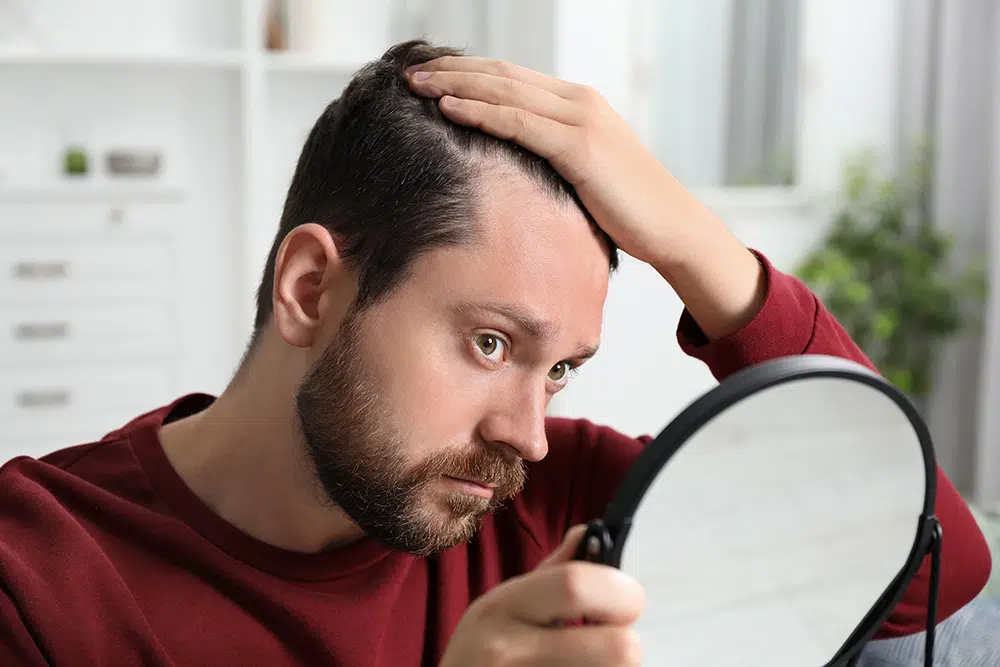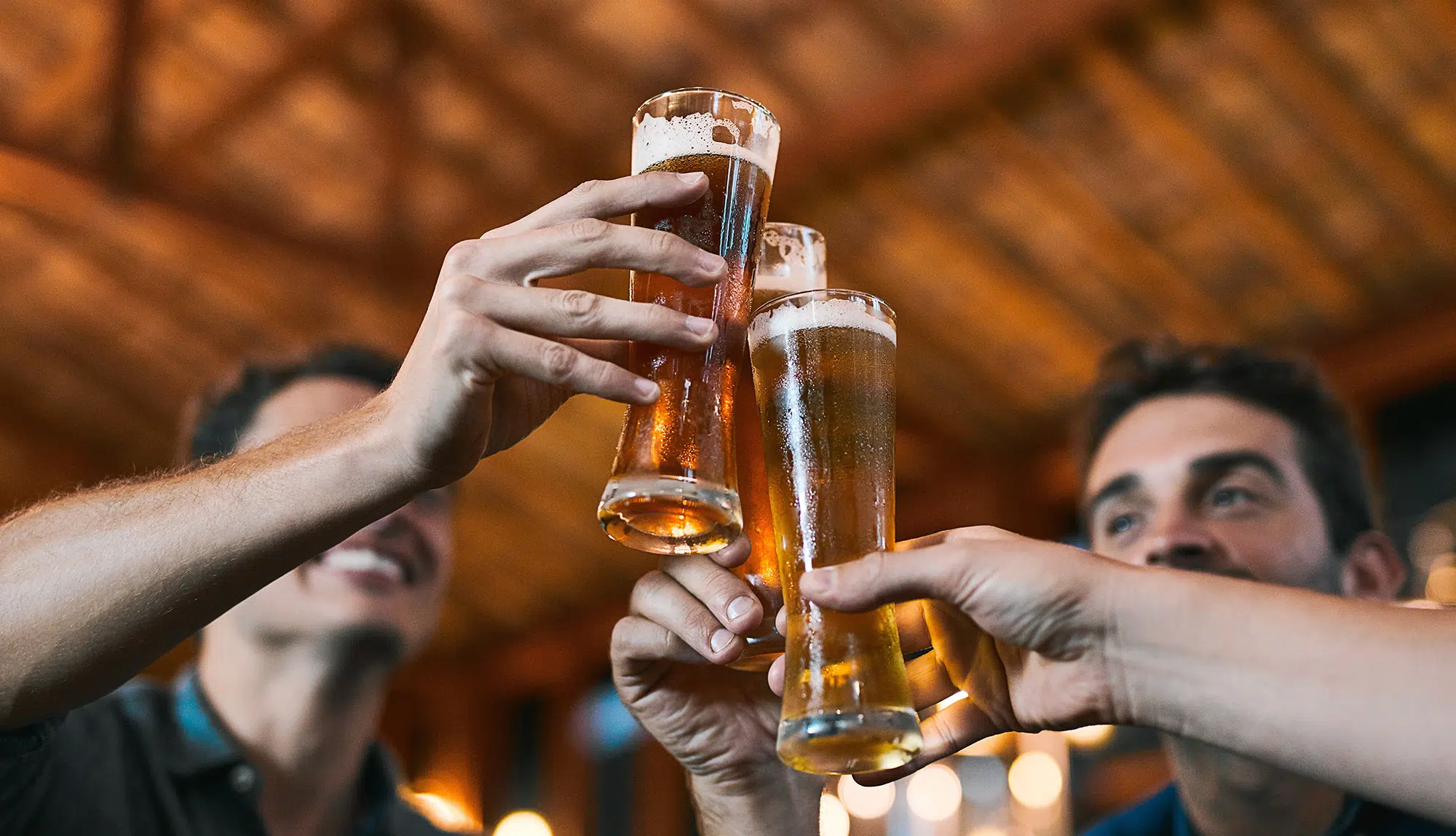Is Alcohol Making You Bald? Understanding Its Impact on Hair Growth
Last updated on August 19, 2025
For many people, enjoying a drink or two is a normal part of social life. But if you’re starting to notice thinning hair or increased shedding, you might be wondering: could alcohol be to blame?
While alcohol alone isn’t likely to cause complete baldness, it can absolutely contribute to hair loss—especially if you’re drinking heavily or frequently. From nutrient deficiencies to hormonal disruptions, alcohol affects the body in ways that can interfere with healthy hair growth.
In this article, we explore how alcohol impacts your hair, the signs to look for, and what you can do if you’re worried about hair loss.
How Alcohol Affects Hair Growth
Alcohol doesn’t directly kill hair follicles, but it can create the perfect conditions for hair loss to occur. Here’s how:
1. Nutrient Deficiencies
Excessive alcohol consumption can interfere with the body’s ability to absorb essential nutrients—such as iron, zinc, biotin, and vitamin B12—which are critical for hair growth. Heavy drinking can also lead to dehydration and lower protein intake, both of which affect follicle health and hair structure.
2. Hormonal Imbalances
Alcohol can disrupt your endocrine system and lead to increased levels of estrogen in men, which may contribute to thinning hair or even a more feminine hair pattern. It can also affect testosterone and DHT (dihydrotestosterone), a hormone linked to male pattern baldness.
3. Liver Stress and Toxin Buildup
Your liver plays a crucial role in detoxifying the body and regulating hormone levels. When it’s overwhelmed by alcohol, toxins accumulate, and hormonal imbalances may worsen—two factors that can inhibit healthy hair growth.
4. Increased Stress and Sleep Disruption
Alcohol can interfere with sleep cycles, increase cortisol (the stress hormone), and worsen anxiety or depression. Since stress is a well-known cause of hair loss, this adds another layer to alcohol’s negative impact.
Can Occasional Drinking Cause Hair Loss?
Moderate alcohol use—such as a glass of wine a few times a week—is unlikely to cause noticeable hair thinning. The concern arises with chronic or binge drinking, where the effects on the body become more severe and long-term.
That said, everyone’s body is different. If you already have other risk factors for hair loss (like genetics, stress, or underlying medical conditions), alcohol can amplify the problem.
What Does Alcohol-Related Hair Loss Look Like?
Hair loss from alcohol doesn’t follow a specific pattern. You may notice:
- General thinning across the scalp
- Excessive shedding in the shower or on your pillow
- Slower hair growth over time
- Drier, more brittle hair texture
These symptoms are also common in telogen effluvium, a temporary form of hair loss triggered by stress, illness, or nutritional deficiencies—factors that alcohol can easily contribute to.

Frequent alcohol use can lead to thinning hair by affecting scalp health and nutrient levels—book your free consultation at AZ Hair Restoration to start your recovery.
Is Alcohol-Related Hair Loss Reversible?
The good news? In many cases, yes. If the hair loss is caused primarily by nutrient depletion or temporary stress, restoring balance in your body may allow your hair to grow back naturally over time.
However, if alcohol has triggered hormonal shifts or accelerated a genetic condition like male pattern baldness, professional treatment may be necessary to stop the progression.
What Can You Do If You’re Concerned About Hair Loss?
If you suspect alcohol is affecting your hair, it’s time to take action. Here are a few steps you can take:
- Reduce or eliminate alcohol intake for several months and monitor changes
- Improve your diet with protein, leafy greens, and foods rich in biotin and iron
- Stay hydrated to support scalp and skin health
- Manage stress through sleep, exercise, and mindfulness techniques
- Book a consultation with a medical hair loss expert
At AZ Hair Restoration in Raleigh, Dr. Arthur Zacco has helped thousands of patients regain fuller, healthier hair with treatments including:
- Growth Factor Therapy: A non-surgical solution that uses your body’s own healing factors to restore hair growth
- Exosome Therapy: Advanced regenerative treatments that improve scalp health and reduce inflammation
- Microneedling with topical growth boosters
- Prescription medications tailored to your hormone profile
- Hair transplants (FUE and FUT) for lasting, natural results
The Best Results Come from Early Treatment
Hair loss is often easier to treat when addressed early. If you’re noticing signs of shedding, thinning, or brittle hair—and especially if alcohol is a known factor in your lifestyle—book a hair growth consultation with our team.
Dr. Arthur Zacco will provide a detailed evaluation and walk you through your treatment options. With over 30 years of experience and advanced hair restoration techniques available in our Raleigh, NC clinic, we’re here to help you get back on track.
FAQs
How does alcohol affect hair growth?
Alcohol affects hair growth in several ways. It can dehydrate the body, reduce protein absorption, interfere with sleep, and impair your body’s ability to process essential nutrients like iron, zinc, and B vitamins. These deficiencies weaken hair follicles and slow down growth. If you’re experiencing thinning linked to alcohol use, our Raleigh clinic can help with tailored solutions like Growth Factor Sessions or Exosome Treatments. Book your hair loss consult today!
Can alcohol cause hair loss in females?
Yes, alcohol can cause hair loss in females, especially if consumed heavily or over a long period. Pound for pound, females have about half the amount of alcohol dehydrogenase in their livers compared to men. So this would make a woman more susceptible to overconsumption of alcohol and alcohol toxicity. Women may experience shedding due to nutritional deficiencies, hormonal shifts, or increased cortisol from alcohol-related stress. At AZ Hair Restoration, we provide specialized care for women with alcohol-related hair loss, offering hair transplant surgery as well as safe, non-surgical treatments that promote regrowth and restore hair density.
Is hair loss a sign of alcohol poisoning?
Hair loss is not typically an immediate sign of alcohol poisoning, which is a life-threatening condition involving severe intoxication. However, chronic drinking—which may lead to long-term liver damage or systemic toxicity—can result in hair thinning over time. If you’re concerned about unexplained shedding or possible alcohol-related hair damage, our Wake County team can perform a detailed evaluation and recommend appropriate hair restoration options. Book a consultation today!
How long does it take to see improvement in hair growth after reducing alcohol?
If alcohol is contributing to your hair loss, you may start to notice less shedding and improved hair texture within 2–3 months of cutting back. However, full regrowth can take longer, depending on how long you’ve been drinking and your body’s ability to recover. Our expert team in Raleigh can monitor your progress and enhance hair restoration with medical-grade treatments or surgical hair transplants like FUE and FUT.









